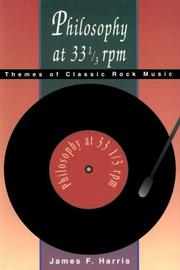Check nearby libraries
Buy this book

True friendship, true community, social and sexual alienation, the death of God, the importance of the present momnet, individual autonomy, the corruption of the state, revolution, the end of the present age - such are the intellectual themes of classic rock.
Sixties rock music left behind the harmless bubblegum and surfing ditties of the 1950s to become a vehicle for the thoughtful commentary upon the human condition. Theories and motifs from philosophy, theology, and literature were reshaped, refracted, and transfigured in this intelligent new popular art form.
Classic rock, argues James harris, should be taken as seriously as the loftiest creations of art and literature. In 'Philosophy at 33 1/3 rpm,' he lays the groundwork for an informed appreciation by exhibiting philosophical themes in the finest rock songs.
Professor Harris's examples encompass all the major rock artists of the classic period (1962-1974), including Paul Simon, Elton John, Pink Floyd, The Grateful Dead, Bob Dylan, The Moody Blues, The Rolling Stones, The Beatles, The Kinks, Cat Stevens, Crosby, Stills, Nash, and Young, The Who, Jefferson Airplane, and Joni Mitchell.
His analyses draw upon the ideas of Aristotle, Bonhoeffer, Camus, Descartes, Freud, Kant, Laing, Marcuse, Marx, Nietzche, Nozick, Rousseau, Sartre, Thoroeau, and Tillich, as well as the Bible and other scriptures, to situate the preoccupations of the classic rock lyricists in the Western intellectual tradition.
True friendship, true community, social and sexual alienation, the death of God, the importance of the present momnet, individual autonomy, the corruption of the state, revolution, the end of the present age - such are the intellectual themes of classic rock.
Sixties rock music left behind the harmless bubblegum and surfing ditties of the 1950s to become a vehicle for the thoughtful commentary upon the human condition. Theories and motifs from philosophy, theology, and literature were reshaped, refracted, and transfigured in this intelligent new popular art form.
Classic rock, argues James harris, should be taken as seriously as the loftiest creations of art and literature. In 'Philosophy at 33 1/3 rpm,' he lays the groundwork for an informed appreciation by exhibiting philosophical themes in the finest rock songs.
Professor Harris's examples encompass all the major rock artists of the classic period (1962-1974), including Paul Simon, Elton John, Pink Floyd, The Grateful Dead, Bob Dylan, The Moody Blues, The Rolling Stones, The Beatles, The Kinks, Cat Stevens, Crosby, Stills, Nash, and Young, The Who, Jefferson Airplane, and Joni Mitchell.
His analyses draw upon the ideas of Aristotle, Bonhoeffer, Camus, Descartes, Freud, Kant, Laing, Marcuse, Marx, Nietzche, Nozick, Rousseau, Sartre, Thoroeau, and Tillich, as well as the Bible and other scriptures, to situate the preoccupations of the classic rock lyricists in the Western intellectual tradition.
Check nearby libraries
Buy this book

Previews available in: English
| Edition | Availability |
|---|---|
|
1
Philosophy at 33 1/3 rpm: themes of classic rock music
1993, Open Court
in English
0812692403 9780812692402
|
aaaa
|
| 2 |
zzzz
|
Book Details
Edition Notes
Includes bibliographical references (p. [255]-261) and index.
Classifications
The Physical Object
Edition Identifiers
Work Identifiers
Community Reviews (0)
History
- Created April 1, 2008
- 15 revisions
Wikipedia citation
×CloseCopy and paste this code into your Wikipedia page. Need help?
| July 24, 2024 | Edited by MARC Bot | import existing book |
| November 16, 2022 | Edited by MARC Bot | import existing book |
| November 11, 2022 | Edited by MARC Bot | import existing book |
| November 16, 2020 | Edited by MARC Bot | import existing book |
| April 1, 2008 | Created by an anonymous user | Imported from Scriblio MARC record |









